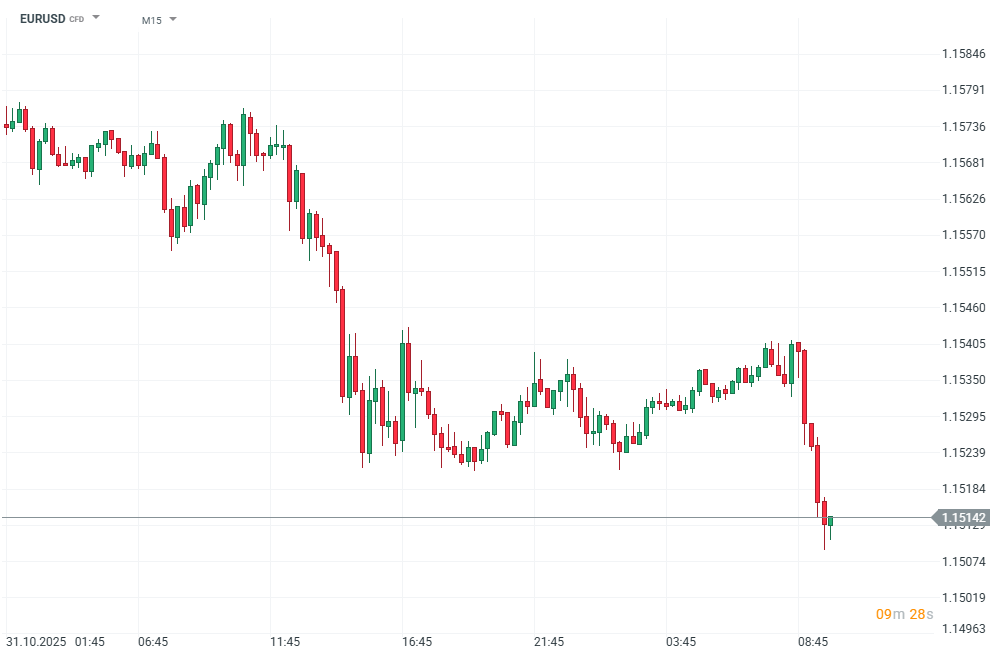08:15 AM BST, Spain - PMI Data for October:
- HCOB Spain Manufacturing PMI: actual 52.1; forecast 51.8; previous 51.5;
08:30 AM BST, Switzerland - PMI Data for October:
- procure.ch Manufacturing PMI: actual 48.2; forecast 47.7; previous 46.3;
08:45 AM BST, Italy - PMI Data for October:
- HCOB Italy Manufacturing PMI: actual 49.9; forecast 49.3; previous 49.0;
08:50 AM BST, France - PMI Data for October:
- HCOB France Manufacturing PMI: actual 48.8; forecast 48.3; previous 48.3;
08:55 AM BST, Germany - PMI Data for October:
- HCOB Germany Manufacturing PMI: actual 49.6; forecast 49.6; previous 49.6;
09:00 AM BST, Euro Zone - PMI Data for October:
- HCOB Eurozone Manufacturing PMI: actual 50.0; forecast 50.0; previous 50.0;
European Manufacturing PMI Summary – October
Manufacturing sentiment across Europe remained mixed in October, showing uncertain signs of stabilization but no strong recovery. The eurozone’s overall manufacturing PMI was confirmed at 50.0, matching the preliminary estimate and marking a return to the growth threshold for the first time in months. Output continued to rise modestly, though demand stayed weak and job cuts persisted, highlighting fragile conditions across major economies.
Germany reported a PMI of 49.6, unchanged from the flash estimate and just below expansion. Output rose again, led by investment goods, but new orders and exports remained sluggish. Firms continued to reduce staff and inventories amid weak demand and cost pressures.
France stayed in contraction at 48.8, as political instability and soft demand weighed on production. Manufacturers continued to lower prices to remain competitive, and confidence remained notably weak.
Italy came closest to stabilization with a 49.9 reading, its best in over a year. Output and confidence improved, suggesting the sector may be nearing a turning point, though firms still reported mild demand weakness and margin pressure from discounting.
Spain remained the region’s outperformer, with PMI rising to 52.1, supported by strong output and new orders. However, hiring slowed and exports softened, partly due to weaker demand from France.
Switzerland, though outside the eurozone, continued to improve with PMI at 48.2 (up from 46.3). The sector remains under pressure from global protectionism but has been recovering gradually since mid-2023.
Overall, European manufacturing is showing early signs of stabilization after a prolonged slump. Growth in southern economies like Spain contrasts with ongoing weakness in core countries such as Germany and France. Persistent job cuts, weak demand, and external headwinds continue to cap momentum, leaving the eurozone’s recovery fragile but slowly emerging. EURUSD is declining, but the sell pressure is not triggered by the PMI data.

US100: Wall Street's stronghold of growth❓
US focus: three things to watch this week
BREAKING: EURUSD gains after US ISM data 💡
Chart of the day - OIL (03.11.2025)
This content has been created by XTB S.A. This service is provided by XTB S.A., with its registered office in Warsaw, at Prosta 67, 00-838 Warsaw, Poland, entered in the register of entrepreneurs of the National Court Register (Krajowy Rejestr Sądowy) conducted by District Court for the Capital City of Warsaw, XII Commercial Division of the National Court Register under KRS number 0000217580, REGON number 015803782 and Tax Identification Number (NIP) 527-24-43-955, with the fully paid up share capital in the amount of PLN 5.869.181,75. XTB S.A. conducts brokerage activities on the basis of the license granted by Polish Securities and Exchange Commission on 8th November 2005 No. DDM-M-4021-57-1/2005 and is supervised by Polish Supervision Authority.


